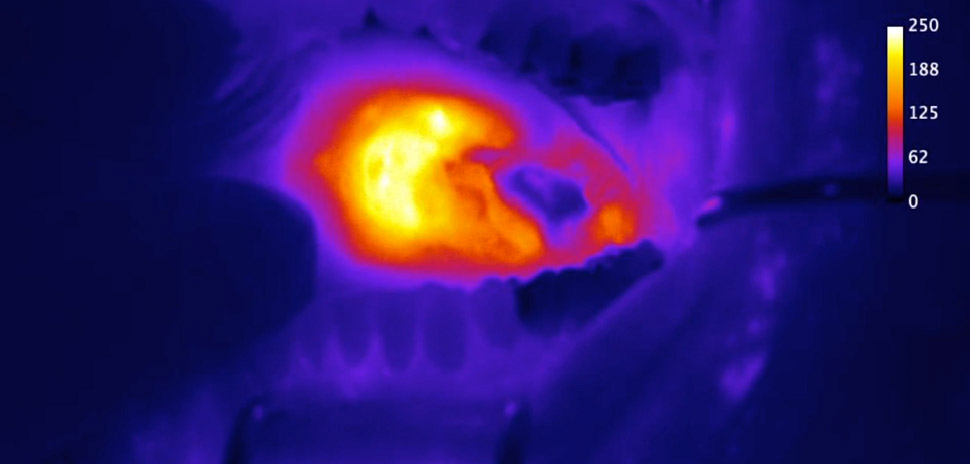Southlake-based biotech startup OncoNano Medicine says it’s received a $9.97 million grant from the Cancer Prevention and Research Institute of Texas (CPRIT) to expand uses for its innovative lead product, OHM-100, that “lights up” a tumor to distinguish it from normal tissue.
The grant is OncoNano’s third for its tumor biomarkers. The startup received $6 million from the Texas cancer agency in 2016 to advance ONM-100 and another $15.4 million in 2019 for ONM-500, an oncology product that also builds on the company’s proprietary pH-sensitive technology.

Ravi Srinivasan, PhD, CEO and Co-founder of OncoNano Medicine, Inc. [Photo courtesy OncoNano Medicine, Inc.]
CPRIT has been a partner since the company’s founding, OncoNano CEO and co-founder Ravi Srinivasan said. The new funding received from the agency for ONM-100’s pH-sensitive approach for imaging metastatic disease can solve “a tremendous unmet need,” he said in a statement.
Srinivasan explains that there are limited tools available that can allow doctors to visualize tumors that have metastasized, in particular, the “small and disperse ones often characteristic of metastatic disease.”
ONM-100 can help surgeons visualize cancer tumors during surgery by making cancerous tissue “light up,” according to Srinivasan. The imaging allows for more precision to ensure that tumors are fully removed during surgery. The product has been granted a fast track designation from the Food and Drug Administration (FDA) and is currently in Phase 2 clinical trials.
During the trials, researchers learned that ONM-100 also can be used to image and stage metastatic disease. That has the potential for saving lives: The improvement of visualization of metastatic disease—preoperatively and during surgery—is closely tied to patient survival.
OncoNano said metastatic disease represents some 45 to 50 percent of all cancer diagnoses, and it’s the cause of 90% of patient deaths. Better visualization of tumors is “critical for diagnosis, staging, therapeutic choice and efficacy,” it said.
Cindy WalkerPeach, PhD, chief product development officer at CPRIT, said the agency is looking forward to the clinical trials that clearly demonstrate favorable impact to cancer patient care.
“CPRIT continues to be impressed with OncoNano Medicine’s outcomes using their unique micelle technology to detect metastatic cancer,” she said in a statement.
OncoNano, which develops products to diagnose and treat cancer, has a number of products in the works. The other CPRIT funded product, ONM-500, uses the startup’s pH-sensitive micelle technology to deliver antigens to activate immunity for the treatment of cancers caused by the human papilloma virus (HPV).
OncoNano, launched in 2014, is a University of Texas Southwestern spinout. Using technology invented by Dr. Jinming Gao, professor of pharmacology and otolaryngology, and Dr. Baran D. Sumer, associate professor of otolaryngology, the two professors co-founded OncoNano along with Srinivasan, Dallas Innovates previously reported.
The company’s total funding is about $65 million, according to Crunchbase. Last year, Dallas Innovates reported that OncoNano’s Series A funding had reached $35 million in July, and received its second CPRIT grant later that summer.
OncoNano, a TechFW graduate, has many notable ties in the region in addition to its spinout from UTSW. As of late 2019, seven of the company’s 20 employees worked at Alcon, including chief financial officer Matthew Head. Of those seven, six worked at ZS Pharma, a one-time Coppell biopharmaceutical company that AstraZeneca acquired for $2.7 billion in 2015. Currently, CEO Srinivasan is chairman of the board of clinical-stage biotech company CAGE Bio, which expanded to UNT Health Science Center at Fort Worth in July.
![]()
Get on the list.
Dallas Innovates, every day.
Sign up to keep your eye on what’s new and next in Dallas-Fort Worth, every day.





![Dr. Justin Lonon, vice chancellor of Dallas College, addresses the crowd at the recent Goldman Sachs 10,000 Small Businesses Dallas Graduation. [Photo: 10KSB]](https://s24806.pcdn.co/wp-content/uploads/2021/06/GoldmanSachs-10KSB-4992-970-970x464.jpg)























